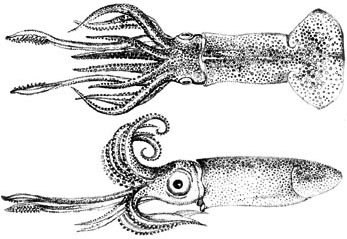Onykia carriboea
Michael Vecchione, Richard E. Young, and Kotaro TsuchiyaIntroduction
O. carriboea is known, with certainty, only from small juveniles. Like most (all?) young in this genus, it is found in the neuston of the surface waters, where it is often associated with the floating seaweed, Sargassum. It has a purplish dorsal surface and silvery to golden sides and ventrum.
Characteristics
Species characteristics change rapidly with growth. Insufficient information is available to distinguish this species from other species of Onykia when comparing only small juveniles.
Nomenclature
This is the type species of the genus. The type locality is the Gulf of Mexico and the Gulf Stream. Specimens of subadult Onykia from the Gulf of Mexico appear to be conspecific with O. robsoni (Kubodera, et al., 1998). Therefore, O. robsoni could ultimately prove to be a junior synonym of O. carriboea. However, detailed comparisons of specimens from their respective type localities are needed before this problem can be resolved. The problem is further complicated by the fact that the holotype of O. carriboea no longer exists (Sweeney and Roper, 1998).
References
T. Kubodera, U. Piatkowski, T. Okutani and M.R. Clarke. 1998. Taxonomy and Zoogeography of the Family Onychoteuthidae (Cephalopoda: Oegopsida). Smithsonian Contributions to Zoology, No. 586: 277-291.
Lesueur, C.A. 1821. Descriptions of Several New Species of Cuttle-fish. Journal of the Academy of Natural Sciences of Philadelphia, 2(1):86-101.
Tsuchiya, K., and T. Okutani. 1991. Growth Stages of Moroteuthis robusta (Verrill, 1881) with the Re-evaluation of the Genus. Bulletin of Marine Science, 49(1/2):137-147.
Title Illustrations

| Scientific Name | Onykia carriboea |
|---|---|
| Reference | Lesueur, C.A. 1821. Descriptions of Several New Species of Cuttle-fish. Journal of the Academy of Natural Sciences of Philadelphia, 2(1):86-101. |
| View | Dorsal, side |
| Size | 25 mm ML |
| Type | Holotype |
About This Page

National Museum of Natural History, Washington, D. C. , USA

University of Hawaii, Honolulu, HI, USA

Tokyo University of Fisheries, Tokyo, Japan
Page copyright © 2011
All Rights Reserved.
- First online 23 June 2003
Citing this page:
Vecchione, Michael, Richard E. Young, and Kotaro Tsuchiya. 2003. Onykia carriboea . Version 23 June 2003 (under construction). http://tolweb.org/Onykia_carriboea/19971/2003.06.23 in The Tree of Life Web Project, http://tolweb.org/










 Go to quick links
Go to quick search
Go to navigation for this section of the ToL site
Go to detailed links for the ToL site
Go to quick links
Go to quick search
Go to navigation for this section of the ToL site
Go to detailed links for the ToL site